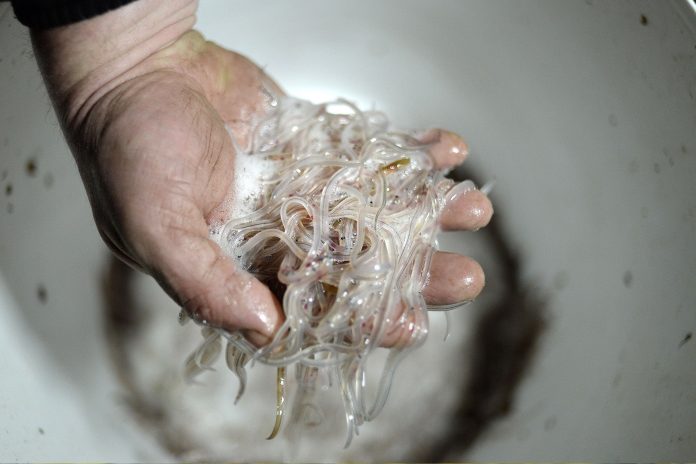On April 5, Canada’s Department of Fisheries and Oceans (DFO) confiscated a $112,000 shipment of baby eels, or elvers, at the Halifax Stanfield International Airport in Nova Scotia. The seizure is part of a broader investigation into elver poaching in Canada. The tiny juvenile fish are the most valuable marine animals in the country and a hot commodity on the global fish market.
DFO authorities intercepted about 55 pounds of the baby eels, also known as glass eels due to their translucency in the early stages of their life cycle. The eels are popular in Spanish cuisine, and they’re used to seed fish farms in China, where adult eels are harvested and sold to Japanese sushi markets. Canadian elvers are currently worth about $2,000 per pound.
The agency sold the confiscated eels and officials are holding the proceeds until an investigation is complete. In a statement to CBC News, a DFO official said the funds will be “forfeited to the Crown” in the event of a conviction.
The news comes amid a steep rise in elver poaching in Canadian waters and an increase in other illegal activities associated with elver fishing. Just last week, a man was assaulted with a pipe during a dispute over elver fishing in Nova Scotia, the Royal Canadian Mounted Police reported. On Wednesday, April 15, members of the Canadian Parliament demanded that the agency put an end to the unprecedented levels of elver poaching.
“Illegal harvesting is happening on rivers that are both designated and not designated as licensed elver fishery rivers by DFO,” Canadian Parliament members stated in a joint press release. “Illegal overfishing of elvers will reduce the sustainability of both baby eels and adult eels.”
The only significant elver fishery in the United States is located in Maine, where anglers dip nets for the baby eels at night in streams and rivers. In 2022, Maine’s elver fishery produced more than $20 million in revenue, making it the second-most lucrative commercial fishing harvest in the Pine Tree State. Maine’s Department of Marine Resources allows for a total of 425 elver fishing licenses each year. The season runs from April until June, or until quotas are met.
Read Next: Alabama Wildlife and Freshwater Fisheries Division Identifies Strange-Looking “Chupacabra”
In response to public outcry and the recent spike in illegal activity, Canadian officials have put an immediate halt on all commercial elver fishing in Nova Scotia and New Brunswick. The ban went into effect on April 15 and will remain effective for 45 days. The DFO cited both safety and conservation concerns when implementing the new rule.








